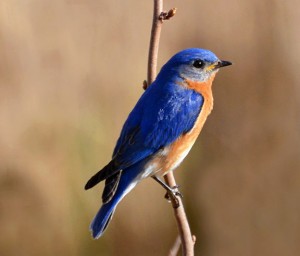“Hello,” said Tiny Leaf, her voice low and pleasant, a rich contralto that harmonized beautifully with the distant jingling of sleigh bells in the library program’s soundtrack… [This is Part 19. Continue reading this installment, or read the story from the beginning.]
Many thanks to Elesia Ashkenazy for kindly giving me a prompt for this story — a bluebird, a construction worker, and a fresh-baked pie.
(Creative Commons image via flickr)
“Can you imagine anybody ever really buying a car as a Christmas present? Those holiday car commercials are totally ridiculous.”
Scowling at the TV, Marcy picked up another slice of pepperoni and sausage pizza from the box on the coffee table. She leaned back into the sagging old couch, trying to find a spot that was at least halfway comfortable. The coffee table wasn’t in much better shape, full of scratches and dings. That luxury car with its gift bows and ribbons looked as much of an alien scene as if it had been beamed from the moon.
“It’s just advertising,” Joe said calmly, sitting to her right. Not much ever bothered Joe; he was a construction worker who took one day at a time. Whenever Marcy got annoyed about something, he would point out that by next year she probably would have forgotten all about it.
And in truth, Marcy knew they had a lot to be thankful for. Now that the recession was over and the economy was looking up, Joe had steady work again, and Marcy finally had gotten a pay raise after going for years without one. Although they had gone through all their savings just to keep the bills paid, at least they’d had enough savings to get through those years without the house being foreclosed. Not all of their friends had been as lucky.
Take it one day at a time, Marcy reminded herself. Still, she was glad the commercial was over. It was never any fun to see things that made her feel poor.
(Creative Commons image via flickr)
After work the next day, Joe went straight from the construction site to a nearby auto dealership and picked out a new midsize sedan to replace Marcy’s ancient clunker. Blue, of course. That was Marcy’s favorite color. Looking at the state Motor Vehicles website on his mobile phone, he found that the personalized license plate BLUBRD was available. And by donating a small extra fee to support the state park system, he could get a license plate that came with a picture of a bluebird in the corner. Just perfect for Marcy’s Christmas present.
He had told her several times already that the clunker needed replacing; it had stranded her at work not long ago, and he’d been out there in the parking lot replacing the starter motor in the dark while she held the flashlight. But Marcy didn’t feel comfortable with buying a new car after so many years of worrying about money. Whenever Joe mentioned it, her answer always was something like, “First we need to build our savings back up, and then we can think about it.”
Although he couldn’t blame Marcy for being cautious about spending, it just wasn’t healthy to go through life always feeling poor and deprived. So, he had made up his mind that this would be the year Marcy got a new car for Christmas, complete with holiday bows and ribbons just like in the commercials. The monthly payments would be manageable, even without putting any money down. He could live with watching TV on the old couch for a while longer.
(Creative Commons image via flickr)
Marcy carried a fresh-baked cherry pie to the new coffee table on Christmas Eve and set the pie down carefully on a towel; it was still hot. She’d taken a vacation day and had the table delivered from the furniture store, as part of a fashionable matched set with a new couch and an end table, while Joe was at work. Although Joe had told her the worn-out old couch didn’t bother him at all, Marcy knew better; she had seen him taking ibuprofen for a sore back on mornings after he fell asleep on the couch watching sports. This would be the perfect Christmas gift for him.
Was that Joe’s pickup truck she heard just now? Marcy wasn’t sure. She had already shut the curtains because it was getting dark. She listened for a moment, but the garage door didn’t go up. Probably not Joe; he’d sent a text message a few minutes ago telling her that instead of coming directly home, he was going to do a bit of gift-wrapping with their friends Carol and Kent. Although Marcy wouldn’t have expected that their well-organized friends would still have wrapping to finish on Christmas Eve, she didn’t think much about it; after all, in the holiday rush, anyone could get behind on things.
So it was as much of a surprise as Joe could have wanted, when he came through the door grinning and told Marcy, “Take a look out the window.”
Pulling back the curtains, Marcy saw her new car in the twilight. It was decorated with shiny bright bows and ribbons in all colors, and even a pair of reindeer antlers made of cardboard and tinsel. Joe’s truck was parked on the street, just in front of Carol and Kent’s big SUV. Evidently they’d helped Joe to get the new car and his truck both home. Standing in the driveway next to the new car, they waved cheerfully when they saw Marcy through the window.
“But, but,” Marcy stammered, gesturing toward the furniture set, “I just spent most of the money in our savings account so you’d be comfortable on the couch! What if…”
Joe took a step toward Marcy and put a finger across her lips.
“No more what-ifs! We’re about to start a new year, and everything is going well. It’s time to feel confident about life again. The new furniture looks great, Marcy, and there’s no need to worry about it. Building those savings back up won’t take long at all.” Wrapping her up in a big hug with his strong arms, he went on to say, “Just a few years ago, we believed many things were possible. Such as, the family we were going to start before the recession hit. I want to get back to making those plans again, Marcy. We can’t keep on living in fear of the future.”
The delicious smell of the cherry pie rose from the coffee table, reminding Marcy of those simpler days when happiness had come so easily to her. Then, all at once, many things did indeed seem possible again; and for the first time in a very long time, thinking of the future made her smile.
Thanks to Carolyn at Nuggets of Gold for contributing a story prompt: hurricane, chameleon, and jellybeans.
(Creative Commons image via flickr)
Ronda struggled to latch the storm shutters as the gusty winds came close to ripping them from her hands. Shut inside the cabin, her cocker spaniel Trevor barked once, a nervous yelp. “Just one more window to go, and then we’re done,” Ronda said loudly, to reassure herself as much as the dog. Fat drops of rain, just beginning to fall, spattered the hood of her nylon jacket. Sunset was still an hour away; but with a hurricane blowing in from the Gulf Coast, already it had gotten so dark that it looked like night.
Spending the winter in Florida had been her husband’s idea. Nolan was a traveling salesman, and Ronda had a small online business, so they didn’t have to stay in their little Indiana hometown but were free to live anywhere they wanted. Getting away from the snow and enjoying the sunny days and lovely wildlife of Florida had seemed like a great idea. But as it turned out, there hadn’t been much sun—three strong storms already, and it was only December.
Getting the last shutter fastened, Ronda hurried inside just ahead of a colossal downpour, hoping she hadn’t let any of that lovely Florida wildlife into the cabin with her. She didn’t mind the birds so much because they really were pretty, even though they often kept her awake late at night with their nonstop chirping and squawking. But all those scaly, beady-eyed reptiles, ew! Lizards and snakes everywhere, and the occasional alligator by the roadside—they gave her the creeps.
“We’ll be okay if the power goes out,” she said to Trevor, who wagged his tail as if he could understand her. “There’s plenty of fuel in the generator, food in the pantry, and a flashlight on the kitchen table.”
She took a quick glance in that direction while hanging up her jacket. Yup, there was the flashlight, next to a green plastic bowl full of jellybeans. All of a sudden, Trevor launched himself toward the table, barking furiously! Jellybeans flew everywhere, and the bowl hit the floor. Fortunately Ronda already had eaten most of her favorite flavors, and many of the spilled jellybeans were lime green, which she disliked.
Just then, the power flickered and went out. It came back on a second later, before Ronda reached the table. And that was a very good thing, because when the lights came on again they revealed a lime-green chameleon perched on the flashlight handle, right where Ronda had been about to reach—staring at her with its big bulging eyes.
Trevor growled, Ronda shrieked, and the terrified chameleon leaped off the table and ran for its life! Opening the front door to shoo the chameleon out, Ronda grabbed Trevor by his collar so he wouldn’t go tearing after it. Rain splattered all over the hardwood floor before she could get the door closed, which was okay because the floor needed mopping anyway.
“You can’t have candy, it’s not good for doggies. But you were a brave guard dog, so you can get a treat!” Ronda gave Trevor one of his favorite Bacon Cheddar Biscuits to console him for not being able to eat the spilled jellybeans as she started sweeping them up in a dustpan.
She fervently hoped the chameleon hadn’t been hiding at the bottom of the bowl when she ate jellybeans earlier! And what was it doing here anyway—chameleons weren’t native to Florida, were they? Oh, well, people said all kinds of escaped exotic pets were breeding in the Florida swamps, and Ronda was definitely ready to believe it. Some harmless Indiana snow would be just the thing right about now, she thought, as a huge thunderclap shook the cabin.
“There’s no place like home!” she declared. Trevor wagged his tail agreeably.
Carolyn at Nuggets of Gold kindly provided me with a story prompt: Candy Corn, French Vanilla Coffee and a rainstorm.
A chilly October rain clattered against the windows when Irene woke up. She had been dreaming about work, hurrying to finish a project while evil giant corn stalks sprouted from an overturned bowl of candy corn in the break room. At first she thought she’d overslept; but no, it was Saturday, and she didn’t have to go anywhere! Even if the rain turned to snow, she would be nice and cozy here at home with the heat on. She could stay in bed all morning if she wanted.
But then she remembered the new romance novel she’d been wanting to read. This would be a perfect morning to curl up on the couch with her Kindle and a cup of French Vanilla coffee. Quiet and peaceful, with no distractions. Just what she needed after a hectic week. She imagined she could smell the coffee already.
As soon as she opened the bedroom door, the coffee smell got stronger. Not French Vanilla, though it seemed familiar. And what was all that noise coming from the living room? She turned the corner and found her husband Rick sprawled on the couch in his shorts, watching mixed martial arts.
Every inch of the coffee table was totally covered with donuts, crumbs, candy bar wrappers, the morning newspaper, and a cup of that weirdly familiar coffee. The aroma left her thinking of Halloween parties, and something else—what was it that she had been dreaming about earlier? On the TV, some big tattooed guy was choking his opponent into unconsciousness on a bloody mat while the crowd cheered.
“Yeah! Awesome guillotine choke!” Rick grinned cheerfully and scratched his unshaven chin as the referee stopped the match. He moved over to make space on the couch. “Irene, you’re going to love this coffee! The supermarket was out of your favorite French Vanilla when I got the groceries yesterday, so I bought the latest seasonal K-cup variety instead—Candy Corn flavor!”
The rain and wind rattled the windowpanes even more, as if it might indeed be about to change over to snow, or at least freezing rain.
“Actually, I don’t feel much like drinking coffee today. I’m just going back to bed.” Irene pulled her robe more tightly around herself; she had been standing near the window where it was drafty. “And this afternoon, I plan to clean out all the junk that’s been piling up in the spare room. After that I’m going to paint the walls and buy some new furniture so that I can use it as a sitting area. A couch with a nice floral pattern would be just the thing, wouldn’t you say?”
Rick scratched his chin again, looking quite baffled. “Okay,” he mumbled after a while, turning his attention back to the TV as the next fight started.
This story’s prompt, contributed by Noelle Vignola, is from the poem Emerald Spider Between Rose Thorns by Dean Young: “Imagine, not even or really ever tasting a peach until well over 50, not once…”
Young people in Texas are supposed to be adventurous, so I wasn’t at all surprised when my brother Davey grew up to be an oil worker. I never had a clue what got into him three years ago, though, when he moved to Alaska to work in the oilfields of the Arctic Circle. He had plenty to say about the beauty of the midnight sun, the aurora borealis, and the caribou herds thundering across the tundra; but as for me, well, I wouldn’t take all that in trade for one perfect peach from Gran’s backyard tree.
Davey got married last year. He met his bride Rosa, an Alaskan Native who grew up in a small village, when she started working for the oil company as an industrial nurse. Just before the Fourth of July, he brought Rosa and her mom Celeste here to Amarillo for a week’s visit. Both mother and daughter smiled a lot and were short and plump; they had lovely smooth complexions and big, dark, alert eyes. Celeste hadn’t ever traveled outside Alaska before. When I gave her a fresh-picked peach, she closed her eyes in delight after the first bite, with the juice running down her chin unnoticed.
The week went by all too fast. After we took our visitors (and how strange to think of Davey as a visitor!) to the airport for the return flight, Gran shook her head in pity as we started walking back across the parking lot. Her steel-gray curls drooped in the waves of heat rising from the asphalt.
“Just imagine, Lori Beth—imagine, not even or really ever tasting a peach until well over 50, not once. Oh, I suppose they must have grocery stores in Alaska, but really,” and Gran waved a hand dismissively, making clear that she wouldn’t count rock-hard peaches in grocery stores as real fruit or anything close to it.
I was just about to agree with her, and then I started thinking about when I’d first come here. Davey and I were born in San Diego. The first time we ever saw snow was when Mom brought us to Amarillo for what she said was a Christmas visit, just as a ferocious winter storm blew in off the prairie. We gleefully ran around building snowmen and snow castles, never thinking about why Mom crammed the old Ford’s trunk full of all our clothes if we were only staying for Christmas. Every time one of us asked when we’d go home, Gran just said, “Well, bless your heart, child,” and sent us out to play. We had no idea what was going on until some kids at our new school explained what a divorce was.
“I never saw snow till I was five,” I said, watching a plane’s takeoff as it circled around to the west, its long curved trail streaking into the setting sun.
Davey had told me that Rosa and Celeste’s ancestral language had dozens of words for different kinds of snow. Heavy and wet, powdery and light, a soft fresh snowfall on bare ground, old snow half-melted and then refrozen smooth as glass—when I thought about it, I saw how there could be so many words. But living in Texas, I’d never had occasion to think about it before.
Following my gaze toward the departing jet, Gran shook her head again. This was a different motion—a quick, impatient tossing of her curls as if to shoo away unwanted thoughts, like a mare plagued by flies.
“Well,” Gran finally said,” bless your heart.”
This is the final story in a series of three. Click here to read the first.
One tiny dot at a time, the daylilies are taking shape on the sun-splashed canvas, their yellow and orange trumpets vivid against the green-shadowed background. Serra can almost imagine herself in the long-ago tranquility of Monet’s garden—that is, if she ignores the skyscrapers on all sides, the rumbling traffic, the chattering pedestrians, and the buzzing of an edger as one of the park’s groundskeepers comes nearer.
After she finishes the painting, she’ll walk back to the tiny apartment she has reluctantly called home since her divorce three years ago. Serra never cared much for city life, but it’s not as if she has much of a choice now. After losing her middle-management job in the recession, she ended up stuck in long-term unemployment hell, and that was when her husband left her. No kids, thankfully. By now she has given up her car, her jewelry, and her collection of antique jewelry boxes, while trying to convince herself (without much success) that a minimalist lifestyle suits her better anyway.
Last week she’d had a particularly awful interview for an office assistant job that was far below her qualifications. The hiring manager, an older man with deep creases around his mouth that gave the look of a perpetual smile, hadn’t even gone through the usual checklist of questions before stopping mid-sentence to ask her, not unkindly, “Do you really want this job?”
Taken by surprise, Serra had been about to stammer a response when the manager had told her, even more gently, “You should have said yes already.”
Now as she’s standing at her easel, the hot sun on her face reminds her of the shame she had felt, stumbling out to the bus stop with her briefcase full of useless resumes. Of course she didn’t really want that crummy job, but the rent wasn’t going to pay itself, was it? She tries to focus her attention back on the painting, but there’s no hope for this latest effort at mindfulness: Monet’s imagined garden is long gone.
The nearby edger whines like an overgrown mosquito, loud and annoying. Serra turns her head to locate the sound, flipping a long braid back over her shoulder as she does so. She’d prefer to get her hair done in almost any other style, having been raised by a single mom named Rainbow who grew up on a commune and always had braids hanging down to her jeans pockets; but going to the salon every few weeks is another luxury Serra has given up.
A spot of white in her peripheral vision resolves into a man’s shirt. Serra realizes in annoyance that some guy she doesn’t know has been standing behind her, quietly watching her paint. He looks harmless enough in a business suit, and he’s kind of cute, with dark curly hair and a Latin complexion. She has no intention of letting some random guy waste her time, though. They always vanish when they find out how long she has been without a job, and she certainly doesn’t need any more of that.
She’s about to scowl and tell the guy to shove off; but then she notices the young woman with the edger, cheerfully waving hello to her. Before Serra knows it she’s smiling in response, feeling mysteriously lighter, as if she just put down something much weightier than the paintbrush she’d been holding. Two robins sitting in a purple plum tree chirp smugly, like they were in on the secret all along.
The man standing behind her smiles, too, a flash of bright white in a smooth bronze face. In a pleasant baritone, he introduces himself as Ricardo and says he’s the second-shift manager at the coffee shop across the street. This morning he’s been meeting with bankers about a loan to finance buying out the shop’s owner, who recently decided to change careers.
Serra knows he doesn’t mean to put her on the defensive. It’s just the usual conversation of people who have a place in the world—a category that doesn’t include her anymore. She feels the familiar tension creeping back into her jaw and shoulders as she gives her name. What else is there to say? But this time, something feels different; the stress doesn’t quite take hold. There is still a bit of a smile on her lips, a touch of the moment’s lightness.
“Serra is a nickname, it’s short for Serendipity,” she finds herself explaining, without the usual self-consciousness about having a silly hippie name. Ricardo compliments her on its uniqueness—he’s being sincere, as far as she can tell. When he follows up by asking if she is a professional artist, she figures that’s got to be nothing but flattery. Still, there doesn’t seem to be a reason to let this conversation bother her; so she goes ahead and tells Ricardo that she paints as a hobby and doesn’t have a job at present.
She expects he’ll make himself scarce quickly enough after hearing that. Instead, he asks what sort of work she does. Then, much to her surprise, she finds herself telling him the whole miserable story, which she generally never mentions at all. She has kept it bottled up all these years because the last thing she wants is anyone’s pity. Once it starts spilling out, though, Serra just can’t manage to put the lid back on.
Ricardo listens calmly. After a while he asks, “Have you ever waited tables? One of the servers at the coffee shop just quit.”
“Yes, when I was in college,” Serra says. She thinks back to those days, not all that long ago, when life was still an adventure full of shiny new possibilities. Somewhere along the way—she still doesn’t quite know how it happened—life turned into a restricted-access highway fenced in all around by plans and expectations, with ever-narrowing lanes and traffic moving so fast there was no way to slow down.
She never had time for painting after she got so busy. As much as she told herself she’d find a few hours on the weekend, there was always something else to do. The notion of spending a gorgeous summer day at the park, contemplating a bed of daylilies and slowly bringing them to life by way of tiny dots in the pointillist style, wouldn’t even have crossed her mind.
Maybe it was not her choice to travel the side roads and the detours, but Serra realizes she has learned something from them. As with the dots on her canvas, every moment of experience has its place in the picture. She finds to her surprise, when she tells Ricardo she’d be interested in the job at the coffee shop, this time she really means it.
This is the second story in a series of three. Click here to read the first.
It’s always so pretty in the park when the sun is shining straight down at midday. Julie has been working for the park district as an assistant groundskeeper since she finished high school, and she loves it. Even though the park is in the middle of the city and there are tall buildings all around, Julie can hear birds singing and see the green grass and trees, just like when she lived on the farm with Aunt Kathie and Uncle Hank.
She has a mom and dad, too, but they live in another city far away. Aunt Kathie once told her it was because taking care of a sick baby had been too scary for them. Julie had to have heart surgery when she was very little because she has Down syndrome. That’s also why she needed extra help in school.
“It was never that they didn’t love you, bless their hearts,” Aunt Kathie had said, as her long, callused fingers busily snapped the green beans for supper. “Sometimes people have a hard time dealing with their fears.”
The park’s concrete walkways sparkle as the sun blazes down from a cloudless sky. Julie’s edger hums along, trimming back the grass. She imagines that maybe the grass is afraid it will get hurt, like when she was a little girl and cried about getting her hair cut. Bits of grass are scattered all along the concrete behind her, breaking up its flat white sameness.
“All safe,” she chants softly to the grass, her voice blending with the edger’s low vibration. Somewhere off to her left, there’s a car horn blaring. “All good, all safe.”
Julie knows she’s talking to herself as much as to the grass. Moving to the city and learning how to live in an apartment had been scary. Uncle Hank had told her she would be safe and there was no need to worry. Uncle Hank is a reverend, and he preaches at the old wooden church down the road from the farm. This year he’s been talking a lot about Providence, gratitude, blessings, and things working out for the best. Julie likes that word, Providence—it has such a pretty sound to it.
She also likes the word “reverend,” and once she looked it up in the dictionary, finding that it was part of a set of related words. Revere, reverential, reverence. Sometimes words can be fun. Math, well, not so much; but Aunt Kathie helps with the shopping and bills.
“Rev-er-ence,” Julie chants even more softly, feeling that she is now in perfect tune with the hum of the edger. She’s getting close to the end of the walkway, where orange and yellow daylilies spread out along the side of the park. A woman has set up an easel beside them and is dabbing with a small brush at her canvas, filling it with bright dots of color.
Just beyond the daylilies there’s a sidewalk and street with people busily going by. Most of them aren’t looking this way—they’re watching the traffic or talking on their mobile phones. Only the artist painting the lilies seems like she’s fully here. A pigeon grabs a crumb and hops out of the way of the edger.
Two robins are chattering to one another in the grass. As Julie comes closer they take flight, landing on a low branch of an ornamental plum tree. The thick purplish leaves almost glow in the brilliant sunlight. Looking up farther, above the trees, the sky rises into a clear blue vault full of sparkling treasures—wide open for anyone to reach, and so beautiful.
The artist turns her head, tossing a long dark braid back over her shoulder. For a moment the two women’s eyes meet, and Julie waves a hand before she even thinks about what she’s doing. Overflowing with joy, she imagines that it’s radiating from her in all directions, like the sunlight.
“Reverence,” she says one last time, in a whisper so low that she can barely hear her own voice. She feels certain it’s a blessing from Providence that she has shared.
Click here to continue to the third and final story in the series.
The city park with its neatly maintained flowerbeds and ornamental trees always looks like a small square of dark chocolate in the morning, when it’s shadowed by hulking office buildings. Lily can’t complain, or at least she feels that she shouldn’t; for many years she has made good money from her first-floor coffee shop, across the street from the park.
By now the morning rush is just about over. A few cars go by, their daytime running lights soft and glittering like fireflies in the shadows. But mostly everyone is at work now, settling into their cubicles for another day of ringing phones and clacking keyboards. Global commerce is an impatient master.
Lily always thought she’d had it easier with the coffee shop, where she could be her own boss. She hadn’t seriously questioned that assumption, nor had she realized how much stress had crept into every part of her existence, until last year when she got the breast cancer diagnosis. That had left her even busier than usual, of course, what with all the medical appointments and making sure she could keep the shop properly staffed when she wasn’t there. But all those weeks of lying on a hard table getting radiation treatments every day had given her plenty of time to reflect on things.
She smiles at a regular customer who just came in. Gunther is retired, like most of her midmorning clientele, and he walks here every day from the senior citizens’ apartment building a few blocks to the north. Sometimes he plays chess or checkers in the park, if the weather is good and he can find someone interested in a game. He has kindly blue eyes behind his trifocals and a short white fringe encircling his mostly bald head.
“So, Lily,” he says, in a voice that’s still gravelly from decades of smoking, though he gave up the habit a few years ago after a heart attack. “I heard you’re selling the coffee shop and going to work for a cruise line.”
“It’s true,” she answers, bracing herself for a Love Boat joke and wondering who blabbed. She still hasn’t said anything to her parents or brothers about her plans, even though she now has a definite start date on a South Pacific cruise ship next month. She comes from a practical Midwestern family descended from Eastern European shopkeepers. No doubt the first thing they’ll do is get on the phone to everyone they know, gossiping about how she has totally lost her marbles.
Much to her surprise, Gunther promptly declares, “Good for you!” His big white head bobs emphatically as he settles into his usual booth with the red-checked tabletop; Lily favors retro décor. As always, he puts the brown carrying case for his chess/checkers set beside him on the bench seat, just like the briefcase he carried to work for so many years.
“I always wanted to be a cowboy,” he confides, lowering his voice as if he’s afraid to say it out loud, even now. “But that was just a foolish thought—everyone would have said so. Instead I did the sensible thing, got my degree and became an accountant, putting aside enough savings for a comfortable retirement. Now my wife is dead, my kids all moved away long ago, I sold the big house in the suburbs because I couldn’t stand the emptiness, and what use is the money I saved? I should’ve followed my heart and trusted that the Lord would provide, just like for the birds and flowers. Isn’t that how it goes?”
He blinks earnestly up at Lily through his glinting lenses as the young waitress Samantha, blonde hair pulled back in a waist-length ponytail, brings his usual coffee and blueberry muffin to the table.
“Yes, ‘consider the lilies.'” She smiles again, wryly this time. “I haven’t been much good at that myself, for all that my name is Lily. But at least I feel that I’m heading in the right direction now.”
After picking at his breakfast a little, Gunther speaks again, this time not looking up. “If I were younger I’d move out West and start a new career just like you, but it’s too late even to think about that.”
“Not necessarily.” Lily can’t imagine what’s gotten into her to start giving advice like this. Usually she is all friendly chatter, just a lot of meaningless words, nothing that could ever upset a customer or make her sound pushy. She had more than enough of busybodies when she was growing up, and she vowed long ago that she would never become one herself.
But maybe that also had been doubt and fear keeping her silent, in a different way.
When Gunther looks up again, Lily goes on talking, her words feeling solid and right even though she’d had no idea what she was going to say. “Ranchers need accountants just like anybody else running a business, don’t they? You could keep the books part-time on a ranch, learn the business, and then maybe buy your own ranch after a few years.”
Across the street, the park comes to life in vibrant colors as the sun finally rises above the office buildings. On clear days like this, Lily always has felt drawn to the brilliant sunshine like a moth; and now she imagines that she’s seeing the tropical ports and ocean vistas of her longtime dreams. She knows, even before looking back, that Gunther has followed her gaze. When she glances at him again, she sees in his blue eyes the wide-open skies of the West’s mountain ranges.
This is the first story in a series of three. Click here to read the second.
The high school football field’s bleachers bustled with activity as late-arriving spectators found seats after the opening kickoff. Down on the field, the players lined up… [This is Part 18. Continue reading this installment, or read the story from the beginning.]
A fire crackled cheerily on a wide brick hearth, sparks rising and popping as a log settled farther down into the pile. Snowy hills and bare, icy branches gleamed in the moonlight… [This is Part 17. Continue reading this installment, or read the story from the beginning.]







